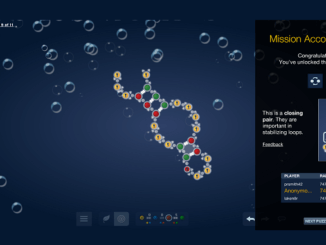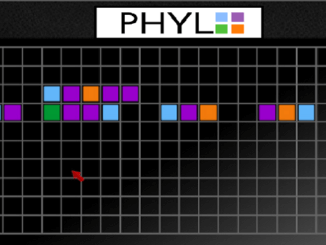What makes an Eterna player?
To generalise, it would appear that there are two broad types of player, though most will obviously sit somewhere between these two extremes. These two types can be neatly summed up by the response of one player when asked what makes a good Eterna player:
“There are different profiles of players in Eterna. Some may be only concerned by their ranking, and then, only their ability to solve puzzles will count towards defining how good they are. Then, there are those like me who are in this for the science and the research.” (Nando)
In terms of attributes shared by Eterna enthusiasts, while agreeing that there is a broad spectrum of types of players, the following two responders summed up a number of useful qualities:
“There are all kinds of players, but most of the top 10–20 players have 1) an analytical mind, 2) a methodical approach to problem solving, 3) patience to work through puzzles that take a lot of time to solve, 4) lots of time on their hands. (Robert Jensen)
“I think anybody can be a good Eterna player, but it helps to be competitive, curious and have an addictive personality.” (Kevin Cabral)
If we, rather unscientifically, assume that these two responses accurately describe the personalities of typical high-level game players, then I think it would be difficult to argue that there are not marked similarities between the players and a significant number of research scientists.
Discovering Eterna
The first encounter with Eterna for many players seems to have come through the popular media, with both a Wired magazine article and the PBS television programme Nova scienceNOW receiving a number of mentions, as did various online science blogs, perhaps belying an underlying general interest in science. However, what seemed to draw many of the players in was the simple appeal of puzzle solving. The lure of RNA creation and scientific discovery seems to take hold later.
“I like solving RNA puzzles, but I would be almost as happy playing Bejeweled. What makes me come back is the lab and the lab results in particular.” (Eli Fisker)
“I have always loved to work puzzles and got hooked on these. When I tried the first few puzzles I couldn’t solve any of them. They made no sense to me so I was both annoyed and challenged. I slowly figured out how to solve most of them although there are still a couple of puzzle types that I can’t solve. So I keep coming back and I will get them in the end!” (Aldwyn Hyatt)
“The initial appeal was the quick ‘success’ of solving an RNA design puzzle. Later it was the challenge of designing RNA to be folded and tested in vitro.” (Jeff Anderson-Lee)
One of the things that became clear as we read through the responses is that while none of the players had any higher-level scientific education, the majority did express an interest in scientific research, whether this be through the popular media or, in one case, through the reading of scientific papers and their dissemination to other players. Despite this, it was generally felt that a scientific background did not constitute an advantage when playing Eterna. Indeed, as one respondent pointed out, experienced non-scientific players generally beat researchers who are new to the game, but may have studied the intricacies of molecular biology for years:
“I think that the ability to see patterns, and come up with strategies, helps to make a good player. The fact that non-scientifically trained, but somewhat experienced players, can beat PhD micro-biology students who have not had much practice with the game in designing in vitro RNA sequences, shows that lack of formal training is definitely not a barrier to entry, and formal training is not a guarantee of success.” (Jeff Anderson-Lee)
One of the players interviewed also put forward a quote, made earlier this year by a different player, that attempted to provide some explanation of why this might be:
“The difference between us and scientists (and there are scientists among us), is we have no idea what should work so we try everything. We’re more creative.” (WaterontheMoon)


